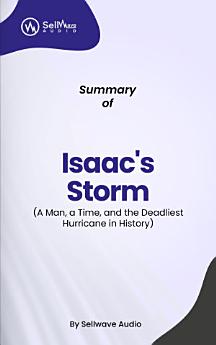Summary of Isaac's Storm: A Man, a Time, and the Deadliest Hurricane in History
About this ebook
Through meticulous research, Larson reconstructs the hurricane using Cline’s own telegrams, letters, and reports, alongside the testimony of survivors. These firsthand accounts give readers an intimate view of the chaos, fear, and heroism that defined those fateful hours. Larson captures Cline’s personal tragedy as he wrestled with professional responsibility and the moral weight of lives lost under his watch, portraying a man both heroic and fallible.
Beyond the narrative of destruction, Isaac's Storm delves into the early science of meteorology, highlighting the limitations of forecasting in 1900 and the broader context of human vulnerability to nature. Larson examines how the lack of reliable warning systems, coupled with Galveston’s growing population and unprepared infrastructure, turned the hurricane into an unprecedented disaster.
The book is both a historical account and a study of human resilience and error. Larson interweaves the science of hurricanes with the human stories of courage, panic, and survival, creating a gripping chronicle that underscores how nature’s unpredictability can clash tragically with human judgment. Isaac's Storm stands as a cautionary tale of hubris, heroism, and the overwhelming force of the natural world.
